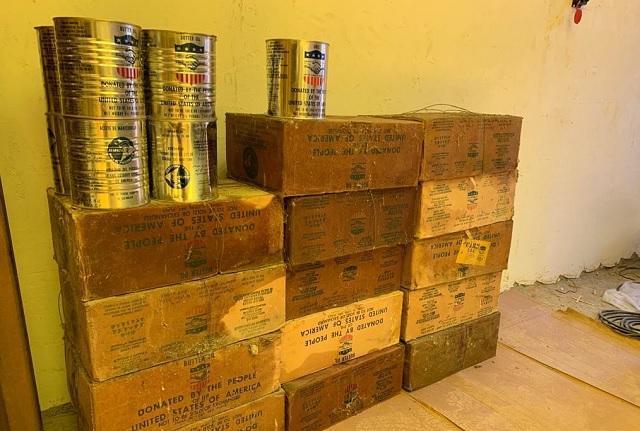
Canned margarine chests, believed to have been sent by the U.S. nearly 50 years ago as part of the Marshall Aid, have been found in the roof of a school that was heavily damaged by a recent earthquake in the eastern province of Elazığ.
A powerful earthquake centered in Elazığ killed 41 people on Jan. 24, damaged hundreds of buildings, including a primary school complex in Ağın district.
The roof of the primary school building was dismantled by municipal workers after a decision to demolish the complex due to severe damage.
As the rubble cleaning process was continuing, some chests closed in a room attracted the attention of the workers.
When 70 dusty chests that looked like historical artifacts were opened, there were never-consumed cans of margarines inside them believed to be least 50 years old.
Because the building was opened in 1960, it is thought that the cans were sent to Elazığ’s Ağın at least 50-60 years ago under the Marshall Plan of the U.S.
The Marshall Plan was an American initiative passed in 1948 for foreign aid to Western Europe and its goal was to rebuild war-torn regions, remove trade barriers, modernize their industries, improve European prosperity and prevent the spread of communism.
Since they are the two countries that best fit this description, Turkey and Greece received weapons and food aid from the U.S. for many years during the Cold War.
But the reason to why these cans were not consumed but stored for half a century in the roof of a school is unkown.
Providing information about the margarine cans found, Mayor Ali Uslu confirmed that the cans are American products.
“It doesn’t have a date on it. However, as far as we understand from the explanation on it, it is written that it is melted plain oil and it was gifted by the people of the United States,” Uslu said.
“They [the cans] were found in the attic during the demolition of the primary school and we could not open the cans either. It should be about 50 years old. It is known that milk powder was distributed to schools before,” he added.
Noting that the weight of a can is two-and-a-half kilograms and there are nearly 70 of them, Uslu stated that they will do a research on these cans.
Although Turkey did not efficaciously participate in World War II, the economic destruction and poverty caused by the war wreaked havoc on Anatolia and led to partial food shortage in the country.
Within the scope of Marshall Aid, food packages were sent to schools in Turkey until the early 1970s and the students were provided with adequate nutrition thanks to the “feeding hour” formed in the lesson calendar.
However, some conspiracy theorists still claim that milk powders and margarines sent by the U.S. have a negative impact on human health and made Turkish children “dependent on American products.”